Page one had Frank D. Aveline wrote on visiting Girard College where he and other Carlisle students saw the Girard students do their drills, toured the founder’s house, and attended chapel. A Ponca chief also wrote a letter to his son Frank Eagle who was attending school at Carlisle. Page two mentioned the bi-centennial of William Penn making a…
Former Student Death
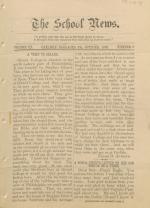
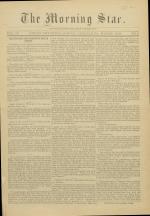
Page one opened with “The Thoughts and Opinions of Indian Agents” which took up the entire page an continued onto page four. Page two had an article on caring for Indians and small pieces on enforced education, and the need for books and paper for school. Page three had the school items, which mentioned things such as the death of Lizzie McNac…
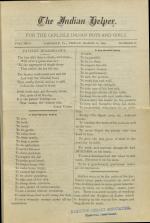
The first page opened with a poem titled "Patient Holding Out,” by Alice Carey. This was followed by sets of twenty-two rules of behavior titled “What a Girl Should Learn” and "What a Boy Should Learn.” The page ended with a paragraph about labor strikes. Page two was filled with small news items that described school activities, news from the…
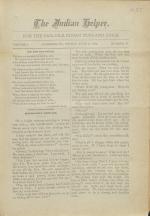
The first page opened with a poem titled "I'm Not Too Young" reprinted from Scattered Seeds. The next article, "Hoe Handle Medicine" extolled the medicinal effects of exercise. Page two featured several small stories, including Paul Eagle Star's (Sioux) outing assignment, a piece describing bicycles for men and tricycles for women, and…
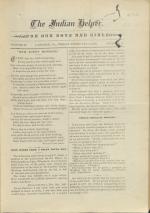
The first page opened with the poem, "New Every Morning" by Susan Coolidge, followed by "Good Words from a Blind Young Man," which was a typewritten letter sent by Joseph Link, student of the Institution of the Blind, to Charles Wheelock (Oneida). There was also an article reprinted from the Truckee (Cal.) Republican, titled "Indian…
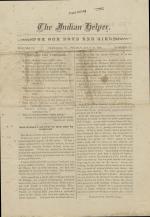
This issue opened with a poem titled “THROUGH AND THROUGH” reprinted from Scattered Seeds.” Also found on that page was “MISS WILSON’S ACCOUNT OF HER TRIP TO SCOTLAND,” a travelogue of the teacher and her sister’s visit by ocean liner to Scotland and Ireland and back. Page two opened with “A Child’s Wise Speech,” that described the…
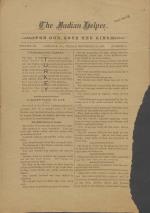
The first page opened with a poem, "Thanksgiving Turkey," a play on the letters in the word "Turkey" followed by a description of the Acoma Pueblo by student Annie Thomas, entitled "A Queer Place To Live." This also was a subject of the article written about the monthly exhibition on page 3. The second page included news of students who…
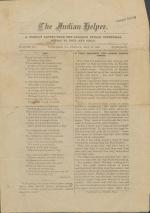
The first page opened with a poem, "Try," followed by a blurb against tobacco use and by "A Visit Through the Lower School Rooms," that reported the activities of students in the lower grades. It continued on page four. The second page bore news of students out in the country, the "disgraceful" portrayals of Indians by Buffalo Bill's Wild West…
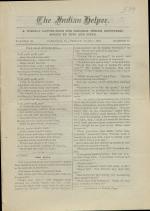
The first page opened with a poem, "The Old Steam Mill," followed by a fictitious conversation between two Carlisle Indian School students, Tom and Ben discussing the merits of work and study. It continued on page four. Page two included news from Pine Ridge Agency, and of the Standing family’s trip to Liverpool, the value of repeating unknown…
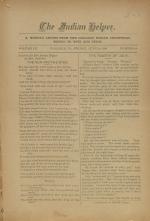
The first page opened with a poem selected “by Mrs. Pettinos,” titled “The Sun and the Wind,” followed by a conversation about the meaning of the 4th of July and how an Indian School student might be influenced to extend his time at the school instead of returning to the reservation. Page two included letters from Frank Lock (Sioux) on outing,…
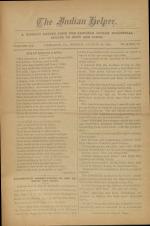
The first page opened with the poem, “What Makes A Man,” followed by an article titled, “Interesting Observations At the Indians’ Own Home” reprinting a letter from Joshua Given (Kiowa) who described the social and political news from the Kiowa and Comanche Agency. He reported the activities of students who had returned home from Carlisle. The…
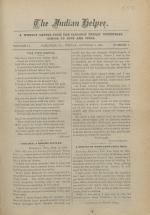
The first page opened with a poem “The Two Words,” followed by Lucy Jordan’s letter to the Man-On-The-Band-Stand titled “Carlisle A Bright Picture” in which she mused about her days’ past at Carlisle and life at home on the Stockbridge Reservation. Next came “A Budget of News from Eliza Bell” (Creek) with word from the Nuyaka Mission, Indian…
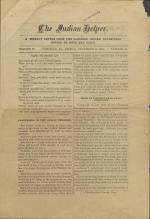
The first page opened with a poem titled “How To Make Up,” followed by an article reprinted from The Sabbath School Visitor titled “Playthings of the Indian Children.” Next came a letter from Nancy Cornelius (Oneida) titled “Items of Interest From Nancy Cornelius,” which was sent from the Training School for Nurses at Hartford, Connecticut and…
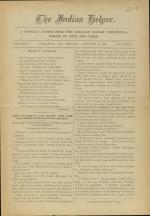
The first page opened with a poem "Bear It in Mind” followed by the third installment of the series titled “How An Indian Girl Might Tell Her Own Story if She Had the Chance: All Founded on Actual Observations of the Man-on-the-band-stand’s Chief Clerk” which continued on the fourth page. Page two offered news from students who were home at…
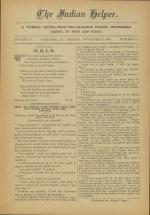
The first page opened with a poem by E.G. titled "U.S.I.D.” followed by the next installment of the series titled “How An Indian Girl Might Tell Her Own Story if She Had the Chance: Founded on Actual Observations of the Man-on-the-band-stand’s Chief Clerk” (continued from the previous week). The story continued on the fourth page. Page two…
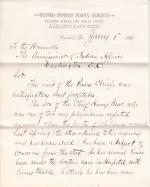
Richard Henry Pratt reports that the visit of Ponca Chiefs Harry Bear, Standing Eagle, and White Buffalo went well. He also notes that Chief Harry Bear asked that his son be returned home due to his falling ill multiple times at Carlisle. Pratt notes that he approved the return home of the student despite his condition improving following…
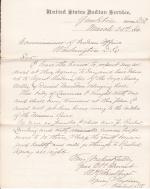
Dr. W. H. Faulkner reports that he has arrived at the Yankton Agency returning both Charley Mills and Daniel Mandan along with the body of Lawrence. He ends his report that he will continue to Rosebud in order to deliver Philip Good Voice home.
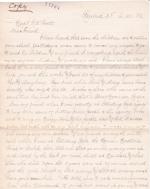
Long Face requests the money that was appropriated to educate his two daughters Rose and Mary who were unable to fulfill their three year terms due to ill health and subsequently death.
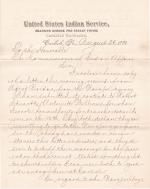
D. M. Riordan, U.S. Indian Agent for the Navajo Agency, writes to the Richard Henry Pratt on the anger of Manuelito regarding the death of his son. Manuelito asks for all of the Navajo students to be sent back from Carlisle. Riordan states that at a minimum Manuelito's son should be returned.
Pratt also states in his letter to…
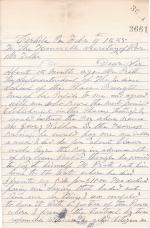
Frank Ensminger writes the Bureau of Indian Affairs regarding a civil dispute between him and Richard Henry Pratt over payment for training George Walker in harness making. Pratt claims that he was only to pay Ensminger if Walker was not a good worker and he never heard a complaint from him and so therefore refused to pay.
Pratt also…
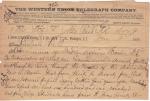
Richard Henry Pratt responds to the visiting Sioux delegation claims of thirty to seventy per cent death rate of returned students dying within four years. Pratt writes that Carlisle has returned 101 students to the Pine Ridge and Rosebud Agencies and 82 are living today.
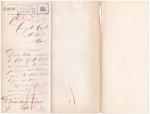
Henry F. Hoyt responds to Richard Henry Pratt's criticisms regarding the medical bill in treating Seth Clear Eyes.
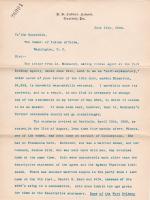
Richard Henry Pratt responds to H. D. McAnaney, Acting U.S. Indian Agent for the Fort Belknap Agency, regarding students from the Agency at Carlisle. Pratt takes issue with the statistics used by McAnaney to determine the death rate of students at Carlisle and further takes issue with the idea that the students suffered from pneumonia at…
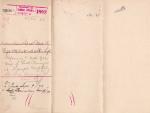
Richard Henry Pratt responds to an Office of Indian Affairs letter regarding a bill and letter from St. Joseph's Hospital covering the care of Seth Clear Eyes. Pratt provides the context of how Clear Eyes ended up at the hospital in St. Paul, Minnesota and directs the Office to direct the bill to him for payment from the Carlisle appropriation…
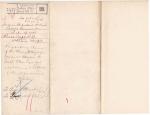
Richard Henry Pratt forwards bill covering the medical attendance for the treatment of Seth Clear Eyes at the St. Joseph's Hospital.
